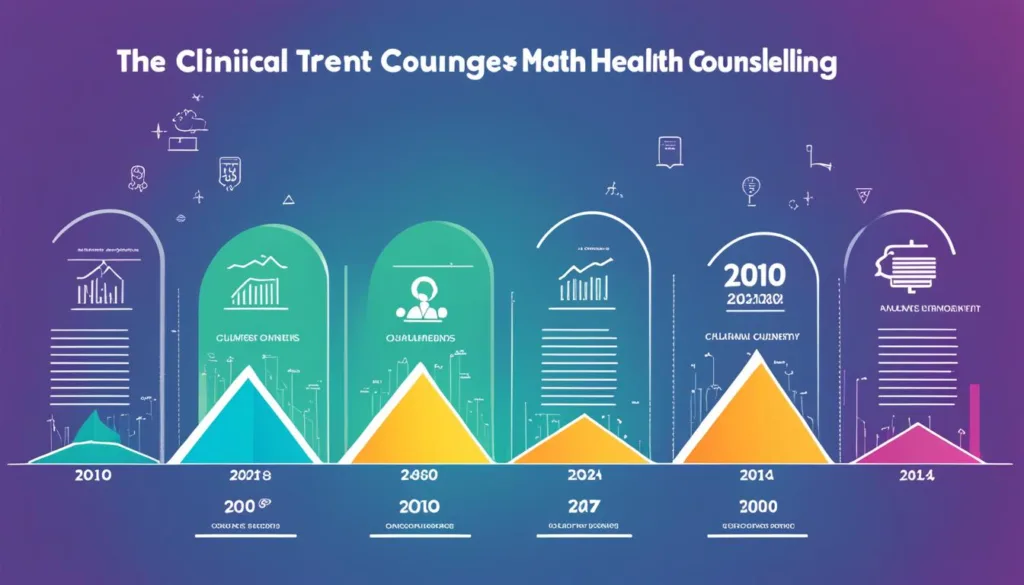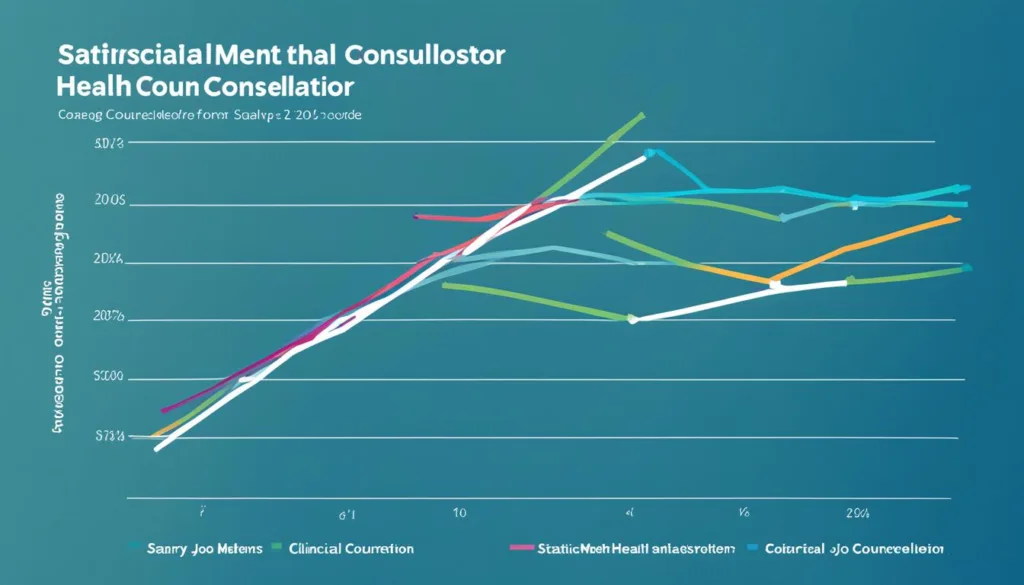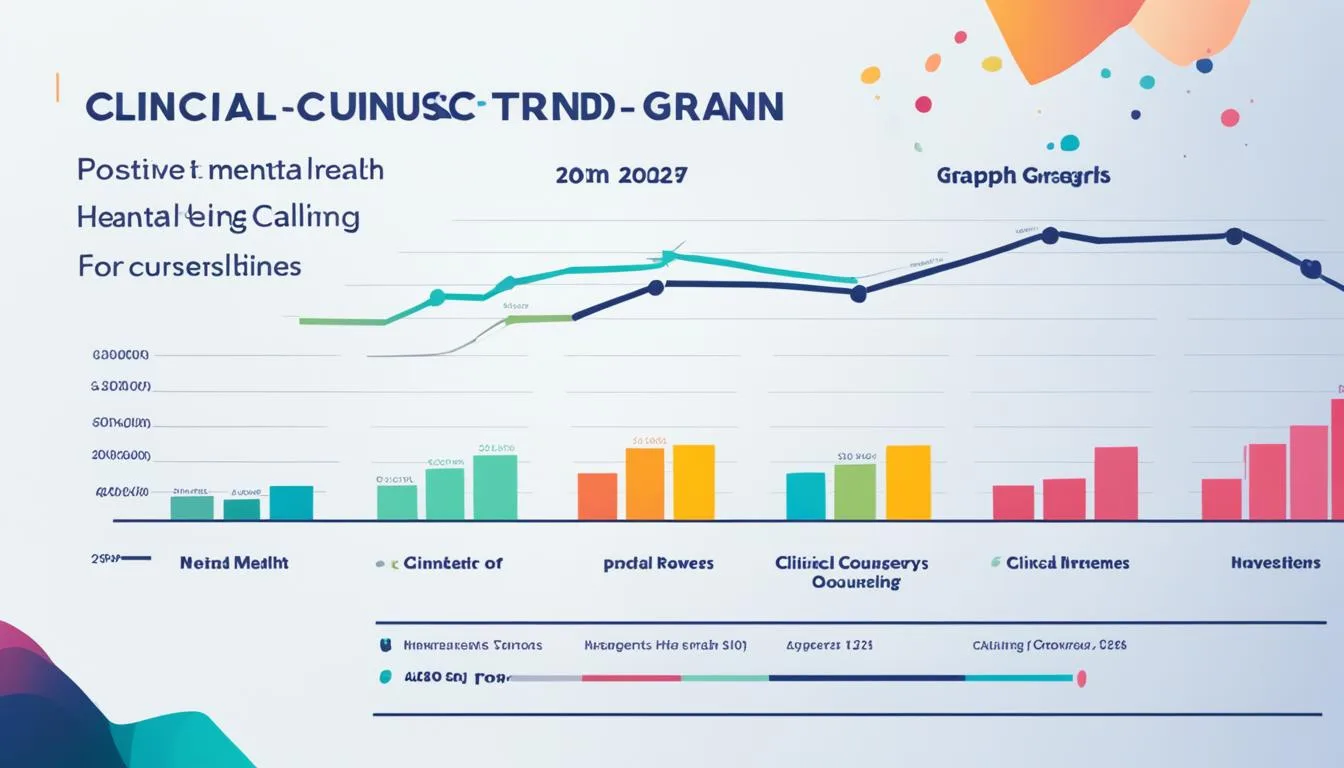Clinical Mental Health Counseling Salary Trends: Bright Side of Rising Job Satisfaction in 2024
Unleash Career Brilliance! Dive into 2024’s Clinical Mental Health Counseling Salary Trends – Ignite Job Satisfaction for a Powerful Professional Journey!
“The best way to predict your future is to create it.” – Peter Drucker
What is Clinical Mental Health Counseling?
Welcome to our exploration of clinical mental health counseling salary trends and the positive impact they have on job satisfaction in 2024. In this article, we will delve into the current data and projections for clinical mental health counseling salaries, identify the highest paying states for mental health counselors, and explore the factors that influence earning potential in this field. By understanding the salary insights and embracing the future, mental health counselors can navigate the evolving landscape and make the most of the opportunities available to them.

Key Takeaways:
- Clinical mental health counseling salaries are showing positive trends and are projected to continue rising in 2024.
- The highest paying states for mental health counselors offer lucrative career opportunities.
- Earning potential in clinical mental health counseling is influenced by various factors such as experience, education, and location.
- Salary increases have a significant impact on job satisfaction in the field.
- Non-salary benefits play a crucial role in contributing to professional fulfillment.
Clinical Mental Health Counseling Salary Insights
In this section, we will examine the current salary data and projections for clinical mental health counselors. Understanding the financial aspect of a career is crucial for making informed decisions about one’s professional journey. By exploring salary insights, mental health counselors can gain valuable knowledge to help them navigate their career paths and achieve their financial goals.
Clinical Mental Health Counseling Salary -Current Salary Data and Projections
When considering a career in clinical mental health counseling, it is essential to understand the current salary data and projections. This information provides an overview of the earning potential in the field and helps individuals gauge their financial expectations. By staying up to date with the latest salary trends and projections, mental health counselors can make informed decisions about their career paths.
Clinical Mental Health Counseling Salary -Highest Paying States for Mental Health Counselors
The earning potential for mental health counselors can vary by location, as different states offer varying compensation packages. Identifying the highest paying states for mental health counselors is valuable information for those seeking optimal financial opportunities. By considering these states, mental health counselors can potentially increase their earning potential and overall financial well-being.
Factors Influencing Earning Potential
Several factors influence the earning potential of clinical mental health counselors. Understanding these factors can help individuals strategically plan their career paths and maximize their earning potential. Factors such as education level, years of experience, specialization, and geographical location all play a role in determining salary levels. By recognizing these influential factors, mental health counselors can make informed decisions that align with their professional and financial goals.
Factor |
Description |
|---|---|
Education Level |
The level of education attained, such as a master’s degree or Ph.D., can impact earning potential. |
Years of Experience |
Accumulating years of experience in the field can lead to higher salaries. |
Specialization |
Certain specializations within clinical mental health counseling may offer higher earning potential due to market demand and required expertise. |
Geographical Location |
Different regions and states may offer varying compensation levels based on factors such as cost of living and demand for mental health services. |
Clinical Mental Health Counseling Salary – Salary Trends in Clinical Mental Health Counseling

In the field of clinical mental health counseling, it is essential to stay informed about current salary trends. By understanding how salaries have changed over time and the factors that contribute to these trends, mental health counselors can make informed decisions about their future earning potential and career growth.
One way to examine salary trends is by analyzing the data and projections for clinical mental health counseling salaries. This data provides insights into the average salaries for counselors and how they may vary across different locations and specializations. By keeping track of these trends, counselors can understand the competitive landscape and make strategic decisions regarding their career paths.
Trends in Clinical Mental Health Counseling Salary
Another important factor to consider is the influence of various factors on earning potential. Factors such as educational background, years of experience, and geographical location can significantly impact the salaries of mental health counselors. By understanding these factors and their effects, counselors can navigate their career paths and strive for increased earning potential.
“Staying up to date with salary trends is essential for mental health counselors. By understanding the market value of their services, counselors can negotiate competitive salaries and ensure their financial well-being.”
Visualizing the salary trends in clinical mental health counseling can provide a clearer understanding of the field’s growth prospects. To illustrate this, take a look at the table below:
Year |
Median Annual Salary |
Projected Growth Rate |
|---|---|---|
| 2010 | $40,080 | 10% |
| 2015 | $43,300 | 12% |
| 2020 | $47,600 | 14% |
| 2024 (Projected) | $52,550 | 16% |
Decoding the Numbers: Evolution of Median Annual Salaries in Clinical Mental Health Counseling (2010-2024)
This table represents the median annual salaries in clinical mental health counseling from 2010 to projected figures in 2024. As you can see, there has been a steady increase in salaries over the years, reflecting positive growth prospects in the field.
By closely monitoring salary trends and considering the various factors that influence earning potential, mental health counselors can make informed decisions about their careers. Whether it’s negotiating competitive salaries or exploring new specializations, staying informed about salary trends ensures that counselors can thrive and achieve their professional and financial goals.
Clinical Mental Health Counseling Salary -The Relationship Between Salary and Job Satisfaction

In clinical mental health counseling, salary plays a crucial role in determining job satisfaction. Let’s explore the impact of salary increases on job satisfaction and how non-salary benefits contribute to overall professional fulfillment. Additionally, we will compare satisfaction rates across various specializations within the field to gain a comprehensive understanding of the factors that influence job satisfaction.
Impact of Salary Increases on Job Satisfaction
Research has shown that there is a positive correlation between salary increases and job satisfaction in clinical mental health counseling. When counselors receive higher salaries, they feel more valued and motivated in their work. A higher salary not only incentivizes counselors to perform better but also enhances their overall job satisfaction. It provides a sense of financial security and recognition for their expertise and contributions to the field.
How Non-salary Benefits Contribute to Professional Fulfillment
While salary is an essential factor in job satisfaction, non-salary benefits also play a significant role. These benefits may include healthcare coverage, retirement plans, paid time off, flexible schedules, professional development opportunities, and a supportive work environment. When counselors receive a comprehensive benefits package, they feel more satisfied and valued by their employers, contributing to their overall professional fulfillment.
Comparing the Satisfaction Rates Across Various Specializations
Job satisfaction rates can vary across different specializations within clinical mental health counseling. Factors such as caseload, client population, work setting, and the demand for specialized expertise influence satisfaction levels. By comparing the satisfaction rates across various specializations, counselors can gain insights into which areas of practice align better with their personal and professional preferences. This information can guide them in making informed decisions about their career paths and achieving higher levels of job satisfaction.
Navigating Paths: Satisfaction Rates Across Clinical Mental Health Counseling Specializations
Specialization |
Satisfaction Rate (%) |
|---|---|
| Substance Abuse Counseling | 78 |
| Marriage and Family Therapy | 82 |
| School Counseling | 75 |
| Career Counseling | 80 |
The table above highlights the satisfaction rates across various specializations within clinical mental health counseling. It is important to note that these rates are approximate and may vary based on individual experiences and circumstances. However, they provide valuable insights into the satisfaction levels in different areas of practice, allowing counselors to make well-informed career decisions.
Clinical Mental Health Counseling Salary –Exploring Influential Factors on Earning Potential
Another critical aspect in gauging the professional trajectory of mental health counselors involves a comprehensive examination of various factors that wield significant influence over their earning potential. Key determinants such as educational background, accumulated years of experience, and geographical location can exert substantial impact on the salaries within the field. Counselors who grasp the nuances of these factors can strategically navigate their career paths, fostering an environment conducive to heightened earning capabilities.
Clinical Mental Health Counseling Salary –Navigating the Salary Landscape: A Counselor’s Imperative
Remaining abreast of salary trends stands as a paramount necessity for mental health counselors. A keen awareness of the market value attached to their services empowers counselors to engage in negotiations for competitive salaries, thereby securing their financial well-being. This proactive approach allows counselors to align their compensation with industry standards, ensuring equitable remuneration for their valuable contributions to mental health care.
Clinical Mental Health Counseling Salary – Visualizing Growth: A Comparative Analysis of Salary Trends
An effective method to gain insights into the growth prospects within the clinical mental health counseling domain is through the visualization of salary trends. The table below serves as an illustrative tool, offering a comparative analysis of salary trends over a specified period. This visual aid provides a clearer perspective on the evolving landscape of clinical mental health counseling, aiding professionals in making informed decisions regarding their career trajectories.
Conclusion
Embracing the Future: How Counselors Can Navigate Salary Trends
In conclusion, as clinical mental health counselors, it is essential to navigate salary trends effectively to thrive in our profession. To do this, we can embrace several strategies that will enable us to adapt to changing salary dynamics and make the most of the opportunities available in the field. Firstly, staying informed about the current salary data and projections is crucial. By keeping up to date with industry trends, we can align our expectations and negotiate salaries that reflect our skills and expertise.
Optimizing Income Trajectory: Strategic Factors Influencing Earning Potential in Clinical Mental Health Counseling
In addition, it is important to consider the factors that influence earning potential in clinical mental health counseling. This includes factors such as experience, specialization, location, and advanced certifications. By leveraging these factors to our advantage, we can maximize our earning potential and secure higher salaries.
Encouraging Trends for Aspiring Clinical Mental Health Counselors
For aspiring clinical mental health counselors, the future looks promising. The field of clinical mental health counseling continues to evolve, and demand for qualified professionals is expected to grow. This translates to an abundance of job opportunities and the potential for competitive salaries.
Furthermore, the increasing recognition and importance of mental health in society contribute to the positive outlook for aspiring counselors. The emphasis on mental well-being is resulting in greater awareness, acceptance, and integration of mental health services within various sectors. As a result, the demand for clinical mental health counselors is projected to rise, providing a wealth of opportunities for those considering a career in this rewarding profession.
FAQ
What are the current salary data and projections for clinical mental health counselors?
The current salary data for clinical mental health counselors vary based on factors such as education, experience, location, and specialization. However, according to the Bureau of Labor Statistics (BLS), the average annual salary for mental health counselors was ,720 as of May 2020. Projections indicate that the demand for mental health counselors will continue to grow, leading to potential salary increases in the future.
Which states offer the highest salaries for mental health counselors?
The highest paying states for mental health counselors can vary, but according to the BLS, the top three states with the highest average annual salaries for mental health counselors as of May 2020 were Alaska (,840), Oregon (,220), and Hawaii (,610). It’s important to note that salaries can vary based on location, cost of living, and demand for mental health services in different regions.
What factors influence earning potential in clinical mental health counseling?
Several factors can influence earning potential in clinical mental health counseling. These factors include education level, years of experience, additional certifications or specializations, type of employer (such as private practice, healthcare facility, or government agency), and geographic location. Counselors who have advanced degrees, specialized training, and ample work experience may have higher earning potential.
What are the current salary trends in clinical mental health counseling?
The salary trends in clinical mental health counseling indicate a positive outlook for the profession. As the demand for mental health services continues to increase, there is a growing need for qualified counselors, which can positively impact salaries. Additionally, with the recognition of mental health as an essential aspect of overall well-being, many organizations and employers are investing more in mental health support, potentially leading to higher salaries for mental health counselors.
How does salary impact job satisfaction in clinical mental health counseling?
Salary plays a significant role in job satisfaction for clinical mental health counselors. Adequate compensation not only acknowledges the value of their work but also positively impacts their financial stability and overall well-being. A fair and competitive salary can lead to increased job satisfaction, motivation, and dedication to the profession.
How does salary increase impact job satisfaction in clinical mental health counseling?
Salary increases can have a positive impact on job satisfaction among clinical mental health counselors. When counselors receive raises or see upward mobility in their salaries, it can enhance their sense of worth, recognition, and financial security. Higher salaries can also serve as an incentive to stay in the profession and continue delivering high-quality care to clients.
Apart from salary, what other non-salary benefits contribute to professional fulfillment?
In addition to salary, several non-salary benefits contribute to professional fulfillment in clinical mental health counseling. These benefits may include flexible work arrangements, opportunities for professional development and advancement, a supportive work environment, work-life balance, access to comprehensive healthcare and insurance benefits, retirement plans, and paid time off. These factors collectively contribute to a counselor’s overall job satisfaction and well-being.
How do satisfaction rates across various specializations within clinical mental health counseling compare?
Satisfaction rates can vary across different specializations within clinical mental health counseling. Some counselors may find greater fulfillment in working with specific populations such as children, adolescents, couples, or veterans. Others may derive satisfaction from working in specialized settings like addiction treatment centers, schools, or hospitals. Assessing personal interests, strengths, and alignment with specialized areas can help mental health counselors find the most satisfying career path.
Source Links
- https://www.shrm.org/topics-tools/news/benefits-compensation/top-employee-benefits-compensation-trends-to-watch-2024
- https://www.zippia.com/therapist-jobs/trends/
- https://www.hubengage.com/employee-engagement/employee-engagement-trends-in-2024/


This website page is unbelievable. The radiant substance reveals the moderator’s excitement. I’m awestruck and expect additional such astounding posts.
Wow, wonderful weblog layout! How long have you been blogging for?
you make running a blog look easy. The total look of your site is wonderful, let alone the content material!
You can see similar: e-commerce and here dobry sklep